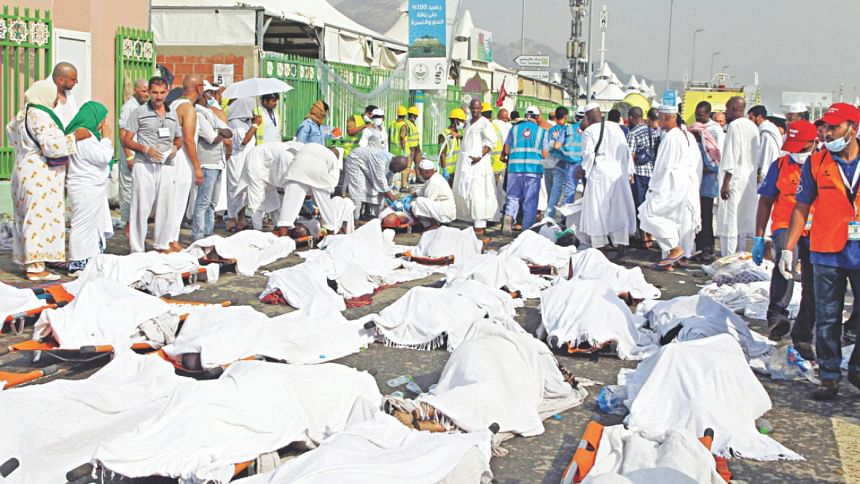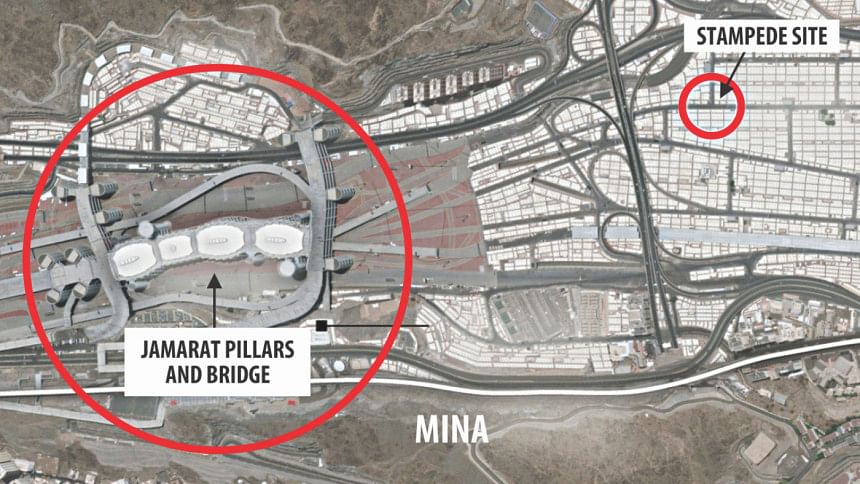Saudi Arabia under fire

Saudi Arabia deployed large numbers of security reinforcements as pilgrims performed the final rituals of a Hajj marred by double tragedy, with the death toll from a stampede rising to 769.
The kingdom's leaders have ordered an inquiry into the disaster -- the deadliest to strike the annual Muslim pilgrimage in a quarter-century -- and a "revision" of its organisation, with the deaths raising tensions with regional rival Iran as well.
Iran's supreme leader Ayatollah Ali Khamenei yesterday demanded Saudi Arabia apologise for the stampede.
"Instead of passing the buck and playing a blame game, the Saudis should accept their responsibility and apologise to the world's Muslims and the bereaved families," he said in comments reported by the official IRNA news agency.
Khamenei also said Muslim countries should demand Saudi Arabia be held to account for the deaths. The kingdom presents itself as the guardian of orthodox Islam and custodian of its holiest places in Makkah and Medina.
"Instead of blaming this and that, the Saudis should accept the responsibility and apologise to the Muslims and the victims' families," he was quoted as saying on his own website.
"The Islamic world has a lot of questions. The death of more than 1,000 people is not a small issue. Muslim countries should focus on this," Khamenei said. Other Iranian officials have also alleged the total death toll is more than 1,000.
Iran has vowed to take international legal action against Saudi Arabia's rulers over the disaster.

"We will urge international courts and circles to start the trial of the Saudis for their crimes against Hajj pilgrims," Iran's Prosecutor General Ebrahim Raisi was quoted as saying by ISNA news agency yesterday. "It is not only incompetence, but a crime."
He has accused Saudi authorities of blocking a road used by Hajj pilgrims to allow a royal convoy to pass through -- which he alleged led to the convergence -- something Saudi authorities have denied.
On Saturday, Iranian President Hassan Rouhani demanded an investigation into the "heart-rending incident" in a speech at the United Nations.
Iran's foreign ministry also summoned the Saudi chargé d'affaires for a third time in three days to protest about Riyadh's handling of the disaster.
At least 155 Iranian pilgrims died in a crush of pilgrims on Thursday near Mecca and 300 other Iranians remain unaccounted for, including former ambassador to Lebanon Ghazanfar Roknabadi, Iranian state media has said.
The disaster, the worst to befall the haj in 25 years, happened when two large groups of pilgrims collided at a crossroads in Mina, a few kilometers east of Mecca, on their way to performing the "stoning of the devil" ritual at Jamarat.
'PLAYING POLITICS'
Saudi Arabia firmly rejected Iran's criticism on Saturday, saying the Islamic republic "shouldn't play politics with a tragedy".
"I would hope Iranian leaders would be more sensible and more thoughtful with regards to those who perished in this tragedy, and wait until we see the results of the investigation," said Foreign Minister Adel al-Jubeir.
The disaster was the second deadly accident to mar the Hajj. A massive construction crane collapsed on the Grand Mosque in the nearby holy city of Mecca days beforehand, killing 109 people, many of them pilgrims.
Undeterred, pilgrims in Mina still flooded the area to perform the ritual stoning for a third time, on the last day of the Hajj which this year drew about two million people.
They also stood in prayer.

Most began leaving on Saturday, returning to Makkah where many performed the tawaf -- where they circumambulate the Kaaba in the middle of the sacred site at the Grand Mosque -- watched on by heavy security.
Dozens of emergency workers were seen on one level of Jamarat Bridge, a five-storey structure in Mina where pilgrims ritually stone the devil, and on which hundreds of thousands were converging when Thursday's stampede occurred nearby.
Many more patrolled the network of roads leading to the structure, which resembles a parking garage.
The interior ministry has said it assigned 100,000 police to secure the Hajj and manage crowds.
But pilgrims blamed the stampede on police road closures and poor management of the throng, during searing temperatures.
"People were trying to manoeuvre to the front for safety but police were saying 'Go back! Go back!'" said Nigerian Abbas Tijani, who escaped with injuries.
"Everybody was trying to survive," he said from his hospital bed. "People were stepped on by people."
In all, 769 people were killed and 934 others were wounded, according to Health Minister Khaled al-Falih.
'FATE AND DESTINY'
Abdullah al-Sheikh, chairman of the Shura Council, which advises the government, stressed that pilgrims must stick to "the rules and regulations taken by the security personnel".
That echoed comments Friday by Health Minister Falih, who faulted the worshippers for the tragedy, saying that if "the pilgrims had followed instructions, this type of accident could have been avoided".
Saudi Arabia's top religious leader, Sheikh Abdul Aziz al-Sheikh, told Crown Prince Mohammed bin Nayef that the incident was beyond human control.
"You are not responsible for what happened," official news agency SPA quoted Sheikh as telling him.
"Fate and destiny are inevitable."
Authorities have yet to provide a breakdown of the nationalities of pilgrims killed in the stampede, as the difficult process of identification continues.
ACRIMONY FLARES UP
Shia Muslim Iran is involved in a number of conflicts in Arab countries, including Iraq, Syria and Yemen, to great opposition from the Sunni Muslim kingdom. The deaths at Mina have caused the simmering acrimony between the two countries to flare up.
A cartoon published by Iran's conservative Tasnim news agency depicted King Salman of Saudi Arabia as a camel trampling pilgrims under its hooves, while the conservative Kayhan newspaper showed the king shaking hands with one of the pillars symbolising the devil in the stoning ritual.
Meanwhile, the Saudi daily AsSharq al-Awsat appeared to blame Iranian pilgrims for the disaster. It quoted what it called Iranian officials as saying a group of 300 Iranian pilgrims had set off to perform a ritual ahead of their assigned schedule, leading to a collision with other pilgrims.
[From AFP, Reuters and Independent.co.uk]

 For all latest news, follow The Daily Star's Google News channel.
For all latest news, follow The Daily Star's Google News channel. 



Comments